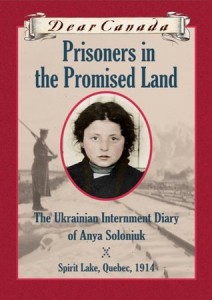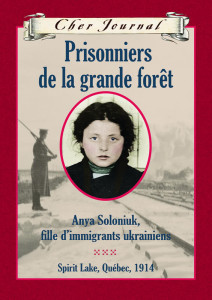The heart-wrenching story of one girl’s experience at a Ukrainian internment camp in Quebec during World War I.
Anya’s family emigrates from Ukraine hoping for a fresh start and a new life in Canada. Soon after they cram into a tiny apartment in Montreal, WWI is declared. Because their district of Ukraine was annexed by Austria — now at war with the Commonwealth — many Ukrainians in Canada are declared “enemy aliens” and sent to internment camps. Anya and her family are shipped off to the Spirit Lake Internment Camp, in the remote wilderness of northern Quebec. Though conditions are brutal, at least Anya is at a camp that houses entire families together, and even in this barbed-wire world, she is able to make new friends and bring some happiness to the people around her.
Author Marsha Skrypuch, whose own grandfather was interned during WWI at Jasper Internment Camp in Alberta, travelled to Spirit Lake during her research for the book. “When we got to the cemetery, I was overwhelmed with emotion. Imagine seeing a series of crosses, all grown over with brush and abandoned, and knowing that the real person you based a character on had a little sister buried there? That real little girl was Mary Manko. She was only six years old when she and her family were taken from their Montreal home and set to Spirit Lake Internment Camp. Her two-year old sister Carolka died at the camp. Mary Manko is in her nineties now and is the last known survivor of the Ukrainian internment operations.” explains Skrypuch.
Excerpt:
Saturday, March 20, 1915
Dear Diary,
Every time I think it can’t get worse, it does. Ten Canadians have been killed in battle, and three Allied warships have sunk. Canadians are angry as bees and they are taking it out on us. Tato, Stefan and Mr. Pemlych have all been sent to northern Quebec. I heard that it is very cold up there and that there are wild animals that eat people.
What did we do to deserve this? Didn’t they ask us to come here in the first place? If the Canadian government didn’t want us, why did they encourage us to come?
Reviews:Brianne Grant on CM wrote:
It has long been my dream to write a story of the treatment of Ukrainians in Canada at the turn of the century, and so I was absolutely delighted to read Prisoners in the Promised Land: The Ukrainian Internment Diary of Anya Soloniuk, by Marsha Skrypuch. As a part of the “Dear Canada” series, it is full of historical information in a diary format. Skrypuch has packed the book with an amazing amount of details without bogging the story down. For fans of historical fiction, this book is a dream.
Anya’s journey begins in Horoshova where her life and the pressures of immigrating are explored. The early diary entries are clipped and short but become more complicated as Anya matures throughout the book. Her father awaits the family in Montreal, and, after a long and terrible boat ride, they are reunited to begin what should have been a promising new life. When the First World War breaks out, an already prickly Canadian reception of Anya and her fellow immigrants turns very ugly. She becomes the sole provider for the family as her father is laid off of work for “patriotic reasons”, but the social climate leaves the streets a dangerous place for Anya and her mother to traverse. Eventually, the family and nearly all of their neighbours are sent away to the Spirit Lake internment camp, where they are treated as criminals, and, as Skrypuch notes, in worse conditions than most other internees around Canada.
The story becomes more compelling as Anya and her family are subjected to an irrational and outraged Canadian socio-political environment. Skrypuch does an amazing job including fascinating bits of information naturally into Anya’s writing. Small details are included like children calling Anya “bohunk,” the costs of goods, and the fear of having a lunch that smells like garlic – a distinctly different smell than that found in the other children’s lunches. By capturing the everyday experience of a new Canadian immigrant at the turn of the century, Skrypuch touches on issues and experiences that could easily be transferable to present day immigrants.
Because of the diary format, the story is limited to Anya’s viewpoint. Despite this, the hardship and experiences of her parents and those around her come naturally into the storyline. Skrypuch includes many details of Anya’s lifestyle and culture at home in Horoshova, and how the family would have functioned were they to remain there.
Skrypuch reaches broadly at the progression of the war, and the policies Canada held during war time. She deftly interweaves the large scope of history not only with everyday life, but also with a literary quality that makes the book compelling to read.
Prisoners in the Promised Land shares a story that has always existed in Canada and yet is rarely told. It is a fantastically thorough and entertaining piece of historical fiction that boldly reveals the many contrasts both of Canadian history and human nature.
Highly Recommended.
Bev Brenna on Saskatoon Star Pheonix wrote:
“Anya’s story, in addition to outlining times when her heart is “wrapped in sadness,” is full of a young girl’s hopes and dreams, her ingenuity in helping her family, and the universal themes of growing up. It will appeal to young people for its direct and honest voice, and in addition to a great story, it contains an important lesson: never again should we deny people their basic rights and freedoms because of where they come from.”
Helen Norrie on Winnipeg Free Press wrote:
“We experience vividly the feelings of a sensitive and intelligent young girl. Anya cannot understand why the deportations have taken place, or why the recent immigrants, who have suffered greatly to come to Canada, must be treated like dangerous prisoners.”
Claire Hazzard on Resource Links wrote:
Skrypuch has tackled a difficult topic with ease in this novel; she is to be commended with how she tackles the issue of internment. Readers will be inspired by Skrypuch’s personal connection to this story; her grandfather was interred at Jasper Internment Camp in Alberta. An essential purchase for every elementary school library, this is a book you can recommend to both Dear Canada fans and historical fiction fans without hesitation.


